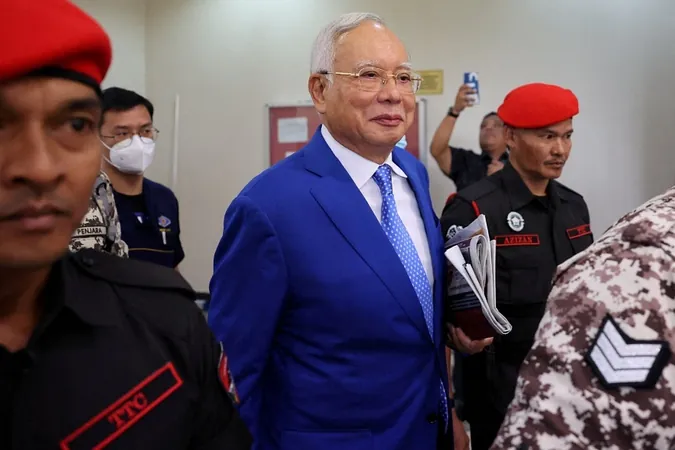
Shocking Twist: Najib Razak Escapes Charges in 1MDB Scandal Amidst Prosecutoral Controversy!
2024-11-27
Author: Yu
KUALA LUMPUR - In a stunning development...
In a stunning development that has left many questioning the integrity of Malaysia's legal system, former Prime Minister Najib Razak and former Treasury chief Mohd Irwan Serigar Abdullah were granted a discharge not amounting to an acquittal (DNAA) on November 27 in a case tied to the notorious 1Malaysia Development Berhad (1MDB) scandal.
The pair had been charged in 2018 for criminal breach of trust involving a staggering RM6.6 billion (approximately US$2 billion) in government funds that were allegedly funneled to Abu Dhabi's state fund, the International Petroleum Investment Company. Justice Muhammad Jamil Hussin criticized the prosecution's handling of the case, citing an "extreme delay" due to their failure to provide essential documents to the defense. This failure to comply with Section 51A of the Criminal Procedure Code ultimately led to the decision to grant the DNAA.
While the court's ruling means that Najib and Irwan are not acquitted outright, they could still face the same charges again in the future. "The DNAA order does not prejudice the prosecution's case," Justice Jamil explained, emphasizing that the prosecution retains the option to re-charge them.
The aftermath of this decision has sparked outrage among legal experts and political analysts. Halmie Azrie Abdul Halim, a senior analyst at Vriens & Partners, asserted that the prosecution's shortcomings reflect poorly on the Attorney-General's Chambers (AGC). He suggested that after six years, the failure to provide relevant documentation was indicative of gross incompetence, calling into question the prosecution’s commitment to justice.
The ongoing fallout raises concerns over public trust in the AGC’s independence. Jerald Joseph, director of human rights NGO Pusat Komas, insisted that the public deserves a credible explanation for the prosecution's failures, warning that perceived incompetency could sow doubts about political interference in high-profile cases.
Election reform group Bersih’s executive director, Ooi Kok Hin, echoed these sentiments, urging the Attorney-General to provide transparency and accountability. He cited this case as a critical test of the AGC’s integrity, given the public's increasing skepticism following mishandlings of such prominent cases.
Despite Najib currently serving a 12-year prison sentence for a different 1MDB-related graft charge involving RM42 million tied to SRC International, the DNAA decision adds complexity to his ongoing legal battles. His sentence was recently reduced to six years by a Pardons Board in January 2024. To complicate matters further, in 2023, Najib was acquitted on separate charges of power abuse relating to the scandal due to prosecution delays.
Facing a barrage of legal accusations, Najib is not out of the woods yet. Another trial is imminent, set to commence on December 2, where he faces charges of receiving illicit funds amounting to RM2.28 billion from 1MDB, alongside multiple counts of money laundering.
In light of this spiraling legal nightmare, Najib's lawyer, Muhammad Shafee Abdullah, remarked on November 25 that the multitude of charges against his client could be described as "carpet-bombing," implying an overwhelming strategy to weaken Najib's defense efforts.
Moreover, analysts warn that the high-profile nature of these cases and the recent DNAA decisions could influence political dynamics in Malaysia. Sociopolitical expert Awang Azman Awang Pawi emphasized that such outcomes might sway public support for political parties and reshape the nation's political landscape.
As the nation watches this legal drama unfold, one question looms: Will Kuala Lumpur's courts uphold their promise of justice or succumb to political maneuvering? Stay tuned for what promises to be a contentious battle in the legal arena!



 Brasil (PT)
Brasil (PT)
 Canada (EN)
Canada (EN)
 Chile (ES)
Chile (ES)
 España (ES)
España (ES)
 France (FR)
France (FR)
 Hong Kong (EN)
Hong Kong (EN)
 Italia (IT)
Italia (IT)
 日本 (JA)
日本 (JA)
 Magyarország (HU)
Magyarország (HU)
 Norge (NO)
Norge (NO)
 Polska (PL)
Polska (PL)
 Schweiz (DE)
Schweiz (DE)
 Singapore (EN)
Singapore (EN)
 Sverige (SV)
Sverige (SV)
 Suomi (FI)
Suomi (FI)
 Türkiye (TR)
Türkiye (TR)